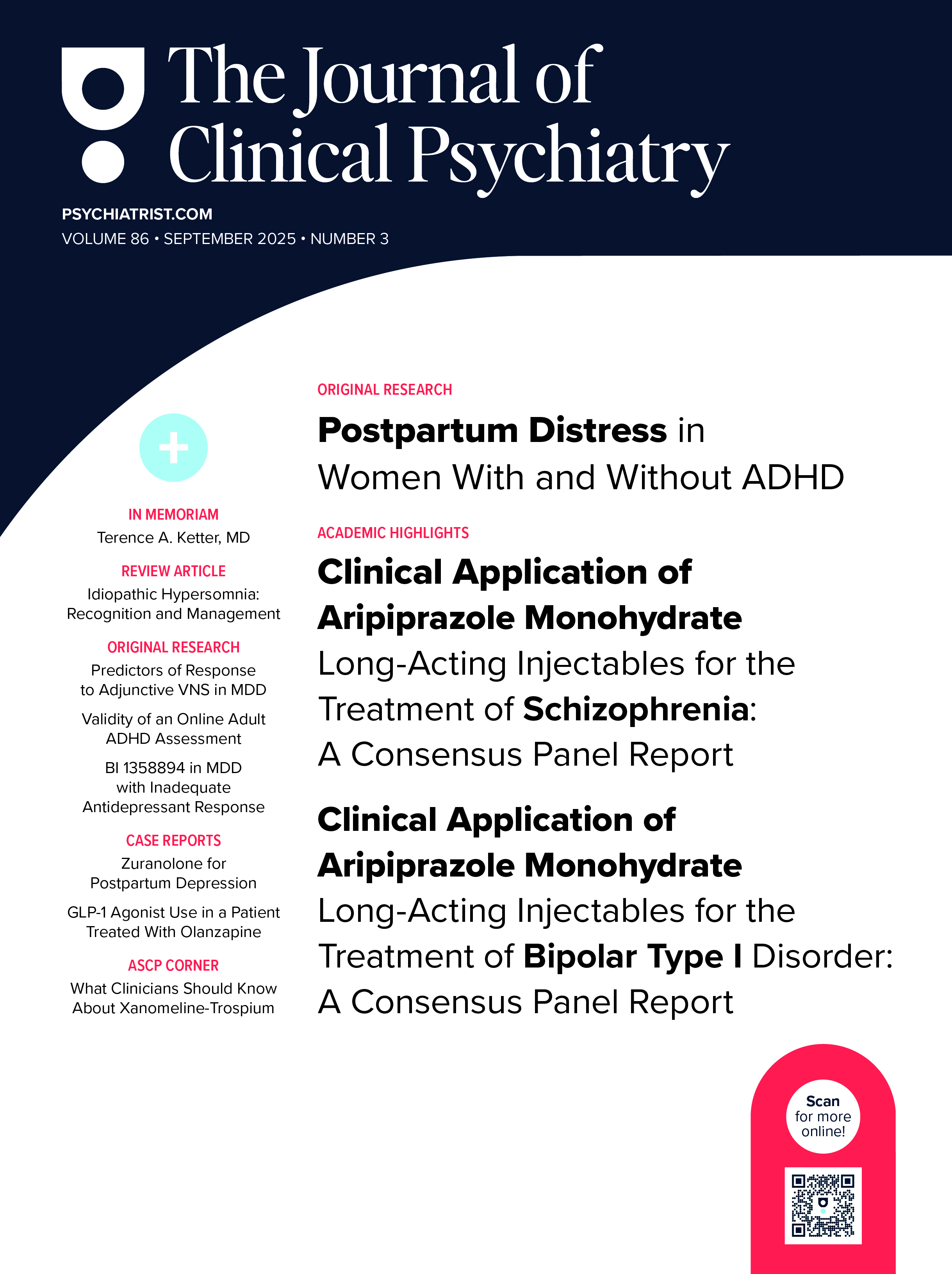Tardive Dystonia Due to Aripiprazole Use in a Neuroleptic-Naive Patient
To the Editor: Lungu et al1 published the first 2 cases of tardive dyskinesia due to aripiprazole in neuroleptic-naive subjects. Both of these subjects had tardive dystonia. One, a 19-year-old woman, had fragile X syndrome and developed her problem after 3 months of aripiprazole treatment. The other, a 56-year-old man, had no preexisting neurologic disorder and developed his movements after 18 months of aripiprazole treatment. Although other tardive syndromes have been ascribed to aripiprazole,2-4 all of the individuals had prior exposure to dopamine receptor-blocking drugs.
The following is an additional case of tardive dystonia due to aripiprazole in a neuroleptic-naive woman with no history of neurologic problems.
Case report. Ms A, a 53-year-old woman seen in July 2009, reported a "lifelong" problem with depression but was first treated with psychotropic drugs starting 5 years before. The only neuroleptic she took was aripiprazole 5 mg/d, started in October 2007. In July 2009, she was taking aripiprazole 5 mg/d and also clonazepam 1 mg twice daily, escitalopram 20 mg/d, and propranolol 10 mg twice daily. She denied any use of prochlorperazine or metoclopramide. She had been an intravenous heroin user in her 20s and had hepatitis C but was HIV negative. She denied use of any other drugs. Results of her neurologic examination were normal except for her involuntary continuous truncal spasms, mostly flexing of her trunk with occasional extension of her pelvis. These occurred when Ms A was sitting or standing but resolved when she lay down. She was also restless when the movements occurred but was relaxed and without movements when lying horizontally. She had mild facial masking and mild bradykinesia and walked without arm-swing. She displayed no choreiform movements.
Aripiprazole treatment was stopped, and Ms A was treated with tetrabenazine 25 mg bid. This caused a mild increase in her parkinsonism and significant benefit in a reduced level of dystonia. This benefit did not persist, however, and 2 months later she was taken off the tetrabenazine. Her dystonia was not signicantly different than at her initial visit.
While there is a general belief that the atypical antipsychotics are associated with fewer extrapyramidal disorders than first-generation neuroleptics, the data in support of this are not clear.5-7 Parkinsonism has been associated with all of the atypical antipsychotics except quetiapine and clozapine,8 but there are few data on how common the other disorders, akathisia, acute dystonia, and the tardive syndromes, are in patients not previously treated with neuroleptics.9 There are few published reports of tardive syndromes occurring with atypical antipsychotics in neuroleptic-naive patients, possibly due to widespread first use of first-generation drugs, possibly due to a lower predisposition to develop a tardive syndrome without prior exposure to a first-generation neuroleptic, or possibly due to less interest by either authors or journals in publishing such cases.
Aripiprazole is a partial dopamine D2 agonist as well as a serotonin 5-HT1A agonist and 5-HT2A antagonist.10 Yet, it has been found, even at low doses, to worsen motor function in people with Parkinson’s disease.11
The occurrence of a tardive syndrome in a neuroleptic-naive patient clearly implicates the single drug as the cause of the disorder. One possible explanation for the presumed lower incidence of tardive dyskinesia12 with the second-generation drugs is that the syndrome simply takes longer to develop. These cases, although only 3,1 argue against this explanation, as all occurred after relatively short exposure to the medication.
As aripiprazole has been approved for treatment of nonpsychotic major depression by the US Food and Drug Administration, and is being advertised for this purpose on television, we may see a marked increase in cases of tardive dyskinesia and parkinsonism. It should be noted that the neuroleptic syndrome has been reported with every atypical antipsychotic, including clozapine.13
References
1. Lungu C, Aia PG, Shih LC, et al. Tardive dyskinesia due to aripiprazole: report of 2 cases. J Clin Psychopharmacol. 2009;29(2):185-186. doi:10.1097/JCP.0b013e31819a4bd5 PubMed
2. Wang LJ, Ree SC, Chen CK. Courses of aripiprazole-associated tardive dyskinesia: report of two cases. Prog Neuropsychopharmacol Biol Psychiatry. 2009;33(4):743-744. doi:10.1016/j.pnpbp.2009.03.023 PubMed
3. Abbasian C, Power P. A case of aripiprazole and tardive dyskinesia. J Psychopharmacol. 2009;23(2):214-215 doi:10.1177/0269881108089591 PubMed
4. Zaidi SH, Faruqui RA. Aripiprazole is associated with early onset of tardive dyskinesia like presentation in a patient with ABI and psychosis. Brain Inj. 2008;22(1):99-102 doi:10.1080/02699050701822493 PubMed
5. Casey DE. Implications of the CATIE trial on treatment: extrapyramidal symptoms. CNS Spectr. 2006;11(suppl 7):25-31. PubMed
6. Swartz MS, Stroup TS, McEvoy JP, et al. What CATIE found: results from the schizophrenia trial. Psychiatr Serv. 2008;59(5):500-506. doi:10.1176/appi.ps.59.5.500 PubMed
7. Naber D, Lambert M. The CATIE and CUtLASS studies in schizophrenia: results and implications for clinicians. CNS Drugs. 2009;23(8):649-659. PubMed
8. Chou KL, Friedman JH. Are atypical antipsychotics associated with a reduced risk of developing parkinsonism? Nat Clin Pract Neurol. 2006;2(3):132-133. doi:10.1038/ncpneuro0129 PubMed
9. Tarsy D, Baldessarini RJ. Epidemiology of tardive dyskinesia: is risk declining with modern antipsychotics? Mov Disord. 2006;21(5):589-598. doi:10.1002/mds.20823 PubMed
10. Grunder G, Carlsson A, Wong DF. Mechanism of new antipsychotic medications: occupancy is not just antagonism. Arch Gen Psychiatry. 2003;60(10):974-977. doi:10.1001/archpsyc.60.10.974 PubMed
11. Friedman JH, Berman RM, Goetz CG, et al. Open-label flexible-dose pilot study to evaluate the safety and tolerability of aripiprazole in patients with psychosis associated with Parkinson’s disease. Mov Disord. 2006;21(12):2078-2081. doi:10.1002/mds.21091 PubMed
12. Jeste DV. Tardive dyskinesia rates with atypical antipsychotics in older adults. J Clin Psychiatry. 2004;65(suppl 9):21-24. PubMed
13. Trollor JN, Chen X, Sachdev PS. Neuroleptic malignant syndrome associated with atypical antipsychotic drugs. CNS Drugs. 2009;23(6):477-492. doi:10.2165/00023210-200923060-00003 PubMed
Author affiliations: Movement Disorders Program, Butler Hospital; Department of Neurology and Department of Psychiatry and Human Behavior, Alpert Medical School of Brown University, Providence, Rhode Island. Potential conflicts of interest: Dr Friedman has been a consultant for AstraZeneca, EMD Serono, Biogen Idec, and Teva; has received grant/research support from Teva, GlaxoSmithKline, Cephalon, Epivax, Pfizer, GE Healthcare, and Valeant; has served on the speakers/advisory boards of AstraZeneca, Teva, Boehringer Ingelheim, and Glaxo; and has received royalties from Demos Press. Funding/support: None reported.
doi:10.4088/JCP.09l05836gre
© Copyright 2010 Physicians Postgraduate Press, Inc.




